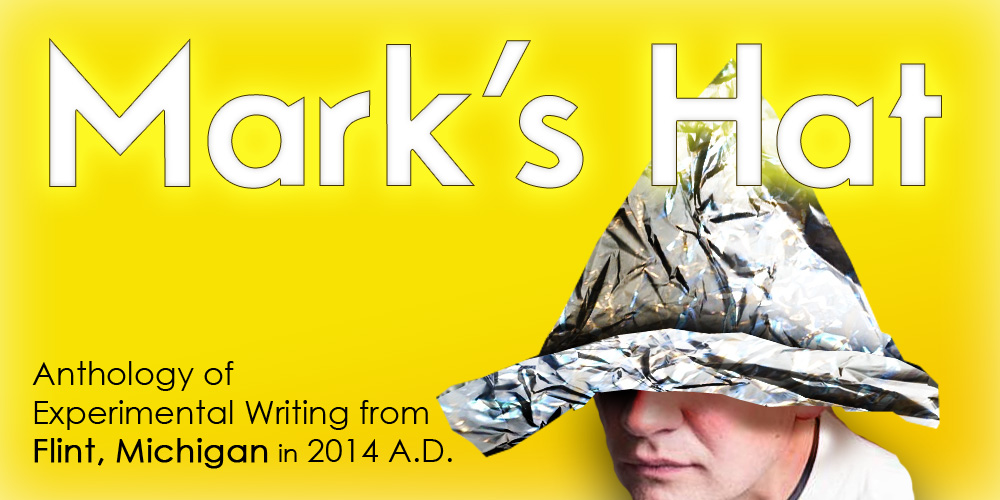Gothic Funk Press is a Flint, Michigan-based publishing company.
Mark’s Hat is our first-ever collection of writing by Flint residents.
If you live in Flint city limits and have a piece of experimental writing — fiction, poetry, or creative nonfiction — under 7,000 words, we hope you’ll submit it to be considered for inclusion in Mark’s Hat. You’ve got until April 30th to send us your work.
If that’s all you need to know, you can follow this link to get more information and upload your submission.
But maybe you’re wondering, “what is experimental writing?”
There are many different ways to answer the question. Here are three possible answers; go with whichever answer you like the most when deciding whether or not your writing fits the bill.
SUPER SHORT ANSWER: Experimental writing is writing that is intentionally unusual, weird, contradictory, paradoxical, and/or self-aware.
SHORT ANSWER: To quote The Routledge Companion to Experimental Literature, all experimental writing shares a “commitment to raising fundamental questions about the very nature of being verbal art itself.” If your writing is unusual in a way that challenges a reader to consider what writing and language is, as well as the social and political orders that seek to exploit language, than you can call it experimental.
LONGER ANSWER: All literature utilizes language and language is a codified attempt at communication between humans. Therefore, all literature exists within the context of attempts at communication between people.
Many of the tactics we regard as “experimental,” such as unstable narratives, formal innovation, esoteric subject matter, and self-conscious arrangement of texts have roots as deep as prose literature itself. Writers such as Miguel de Cervantes and Laurence Sterne wrote profoundly strange novels centuries ago and performances of work by William Shakespeare and the Greek tragedians can be powerfully innovative today.
However, the current tradition of “experimental” literature begins in the years immediately before, during, and after World War I, when movements such as Futurism, Dada, and Surrealism posited that they were, through art, the “avant-garde,” or forefront, of progress. Such artists challenged reigning cultural notions through their creation of art and literature, often in the belief that this work would lead to a more harmonious, utopian social order.
This was an aspect of high modernism which continued to flourish through the mid-20th century, and was exemplified in Europe and the Americas through the work of writers such as Franz Kafka, James Joyce, Samuel Beckett, Virginia Woolf, Ezra Pound, T.S. Eliot, Djuna Barnes, OuLiPo in France, and many, many others.
After World War II, many writers and artists began to feel that the very idea of progress was flawed; that language was an inherently unstable terrain that could never succeed at sharing an objective “truth” (if, in fact, such truth even existed) and these arguments contributed to a more self-conscious, post-modern literature. This literature flourished in the 1960s, 70s, and 80s, with such practitioners as Thomas Pynchon, Anias Nin, Donald Barthelme, Kathy Acker, and many others.
Most recently, writers such as David Foster Wallace and Denis Johnson have reacted to what they perceive as the self-defeating pessimism and cynicism of post-modernism with writing that acknowledges the bias inherent in language, but that responds with a careful or reckless leap into “sincerity.” (In its own philosophy, Gothic Funk Press echoes these sentiments, though we don’t demand them from your submission to Mark’s Hat.)
If it seems like these movements are dominated by white men, it is because they largely are; the traditional discourse of experimental literature through the 20th century follows a largely Eurocentric trajectory. However, experimental writing is been practiced everywhere that literature is enjoyed. This ranges from the magical realism that took root in Latin America with writers such as Jorge Luis Borges and Gabriel García Márquez to the linguistic scrutiny of Indian writers such as Sujata Bhatt and Salman Rushdie to the fantastic dystopias described by Kenyan master-novelist Ngugi wa Thiong’o. In many cases, for example, where English is the official language of a formerly colonized nation (such as India or South Africa), literary experimentation took on the essential task of articulating, proposing, and challenging assumed and imposed notions of cultural identity. In the U.S. writers such as Ralph Ellison, Toni Morrison, and the Guerrilla Girls have challenged the dominant culture through their experimental work, and the resulting dialogue has expanded the boundaries of what we consider to be “avant-garde” writing.
Experimental literature is, by nature, difficult to pin down; it challenges the boundaries of what is and is not literature, and so any time a definition seems to settle, writers move further out, challenging these new norms. This historical answer to the question, “what is experimental literature?” is perhaps most useful for you to understand the cultural traditions in which you are writing and to get started on some reading lists of your own. But when you’re wondering whether your own writing is experimental or not, it might be better to stick with one of the shorter definitions!

